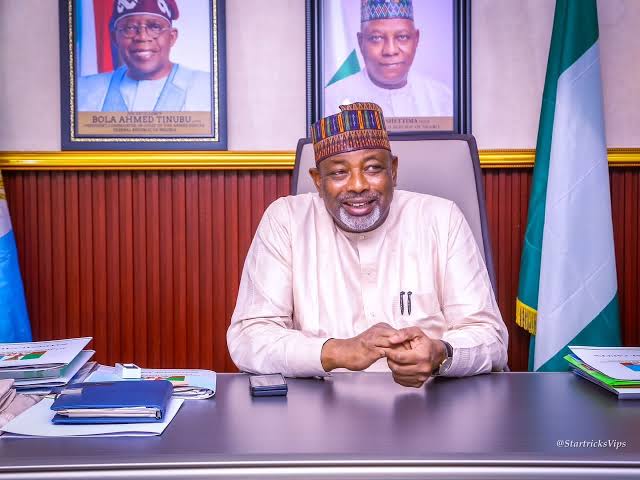Yesterday, Senator Abubakar Kyari, the Minister of Agriculture and Food Security, announced that the Federal Government plans to expand the $1 billion facility from private sector financing for the “Greener Hope National Agricultural Productivity and Large Scale Mechanization Support Programme,” an agricultural mechanization initiative.
During a courtesy visit to the Ministry’s Abuja headquarters, Kyari disclosed this during an introductory statement delivered by Prince Samuel Samuel, Chairman of Origin Tech Group.
In order to promote agricultural mechanization and ensure food sufficiency in the nation, he claimed that the program was designed by Messrs. Origin Nigeria Ltd. with help from the Ministry and authorized by the Federal Executive Council at its meeting on June 25, 2024.
The Minister went on to say that the Federal Capital Territory (FCT) and the participating States will pay back the project facility over a ten-year period by receiving income from the planned farm estates and mechanization services provided to large and medium-sized farms within their geopolitical zones. The federal government will be paid by the participating states, and it will then reimburse the private investors.
He added that the goal of the FCTA and the State Governments is for them to invest in large-scale food production hubs (farm estates) and agricultural mechanization service centers in specific farming clusters across the country. Of these, 150,000 hectares, or 25,000 hectares per each of the six geopolitical zones, are required, with 10,000 hectares for anchor states and a minimum of 2,000 hectares for other participating states.
He said: “The Programme is in line with Mr. President’s Executive order of Declaring State of Emergency on Food Security, that target of cultivating 500,000 hectares of arable land, promoting technologies, enhancing Agro-industrialization, and encouraging youth’s participation in agriculture, towards attaining food security, job and in wealth creation.
“The programme is about the Development of Model Agricultural Mechanization Service Centres and Hubs in designated farming clusters across Food production in the 37 locations. It is a structured and systematic delivery of assorted equipment to the targeted centres across the country, as well as capacity building for 5,000 participants in precision training, mechanization, and agribusiness.
“Messrs. Origin Tech Nigeria Limited through its subsidiary, Origin Automobile Work, is into production assembly of mechanization equipment manufacturing and advisory services, with annual installed capacity for 10,000 tractors production line. They intend to set up an automobile tractor manufacturing plant to produce 5,000 tractors annually, as well as 1,000 mechanization equipment enterprise centres nationwide. The company would source technical partnership from South Korea, Taiwan and Brazil.
“For implementation purposes, the Greener Hope National Agricultural Productivity and Large Scale Mechanization Support Programme would have the provision of 1 Billion US dollar facility from private sector financing, a 20% upfront counterpart fund of 200 Million US Dollars, and the related incentives and support. The execution of the programme will be along the roles and responsibilities of the relevant ministries, offices and bodies.”
The Minister stated that many Ministries, Departments, and Agencies with distinct roles and activities are anticipated to carry out the Greener Hope Agricultural Productivity Program/Large-Scale Mechanization Support Program.
Prince Samuel Samuel, the Chairman of Origin Tech Group, presented a comprehensive program overview, emphasizing the three key pillars that would guide the implementation phase. The first pillar deals with the supply of machinery and equipment, and technical help will be provided for the other two pillars, which include agricultural output and capacity building.
He went over the program’s delivery schedule, responsibilities matrix, and governance structure. He encouraged active participation from all parties involved and gave his guarantee that the implementation would be adaptable in light of the needs analysis and approval of the machinery’s and plant’s final users.
In order to ensure a smooth implementation process, he emphasized the significance of establishing the steering committee and its three subcommittees: finance, technical, and security.




